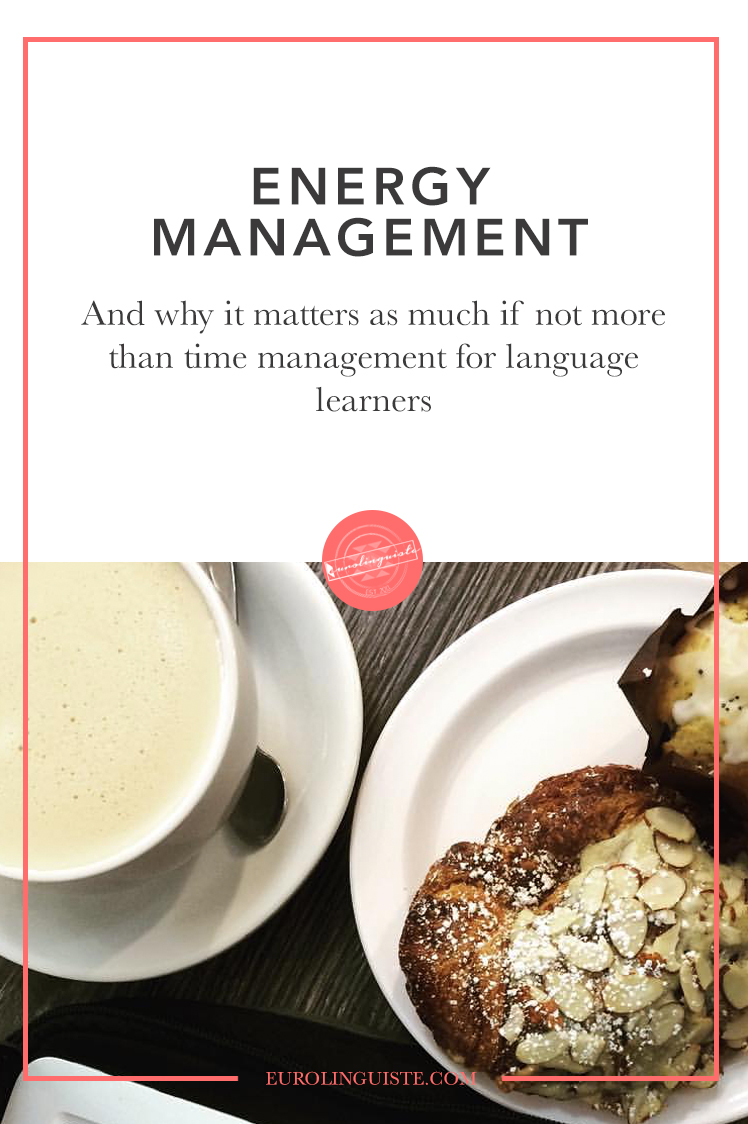Energy Management in Language Learning

My name is Shannon Kennedy and I'm the language lover,…
When we talk about fitting language learning into our schedules, we most often talk about time management.
And while it often seems like we’re low on time, it’s very rarely the case.
Instead, we’re low on time when we have the energy to study language.
Do you have the time or energy to learn a language?
Let me sketch out a scenario for you.
You wake up in the morning, prepare for work, downing your coffee/smoothie/tea before you run out the door. You go to work or school, spending around 8+ hours pouring your energy into it, then zone out on the trek back home. You walk in the door, have dinner, then spend a few moments with your family or flatmates.
Then the moment comes… Your one bit of free time…
What do you do?
Do you pick up your coursebook and start studying your language or do you veg out, play video games, catch up on your fave tv series, or curl up with a book?
Chances are, if you’re as exhausted as I am at the end of the work day, it’s not going to be language study.
And while this scenario may seem like an issue of “not having enough time”, it’s actually a matter of “not having enough energy”.
So how do you solve this? How do you get language learning in there? Where do you find the energy to learn a new language?
How to Find the Energy to Learn a Language
I could tell you to take that free time you have after everything else and just push through it. Go ahead, sit down and study that coursebook despite the fact you don’t have enough mental energy left over to actually remember anything you’re studying. You’re tapped out.
I won’t do that.
Yes, it seems like it makes sense. It’s the obvious window of time! It makes more sense to use it to learn a language than it does to binge watch that hot new television show. You’ll be productive and stop wasting time.
But the thing is, that’s not actually true.
If you sit down and try to learn a language when you’re that worn out, you’re wasting just as much time.
Here’s a couple of equations for you:
(Exhaustion aka Poor retention and focus) x (Potentially productive activity) = Poor results
(Exhaustion) x (Potentially unproductive activity aka relaxing/vegging out) = Rest and better results tomorrow
So how do you find the time to study when you are exhausted during the only time you have the only time you have?
You change how and when you study.
Where to Find the Energy to Study
1. Study in shorter intervals
There’s no written rule that states that you have to have a solid block of time to study. While one hour study sessions are great for intensive or in-depth learning, shorter 5 to 15 minute study sessions can often be just as productive, if not more. Especially if your energy levels are low.
Plus, finding five minutes here or fifteen minutes there throughout the day is easier than finding an entire hour.
2. Do your study earlier in the day
If you’re drained at the end of the day, try to fit your study time in earlier. I often try to make the most of my commute to work. That way, if I don’t get another chance to study during the day, I don’t stress about it because I’ve already done something.
You can also use your morning break at work or school to squeeze in a little flashcard study or a quick read through of the next chapter of your course book just to get an overview of what you’ll tackle during your next focused study session.
3. Take breaks
Sometimes not doing the work is the best way that you CAN do the work. If you’re too tired to do any good during your study, it might benefit you more to skip it. You’ll save yourself a lot of frustration in the long run.
Just make sure that you get back to your language routine after a day or two otherwise you may find you have a difficult time picking it back up.
4. Try something like the Pomodoro Technique
Working short breaks into your schedule is a productive way to give yourself a chance to rest and re-energize. The techniques are called “time-blocking” and they’re a useful way to give yourself time to re-focus.
5. Pay attention to your energy levels
If you notice your energy levels dipping or that your attention is drifting away from your studies, it’s probably time to take a break. Pay attention to when this starts to happen, but more importantly, don’t be hard on yourself when it does.
When your energy wanes, don’t keep studying. If you do, you almost guarantee that you’ll have to do that work and learning over again in the near future.
On the other hand, if you find that you have a bit of energy, don’t waste it! Make sure that you spend the time you’re feeling energetic on productive tasks.
6. Take a walk or stretch when you hit a slump
Physical activity is a great way to give yourself an energy boost, so if you find your energy lagging, take a walk, do a couple stretches or some other physical activity. If you hit a slump at some point during your day, sometimes just moving can amp you up again.
7. Limit boredom
On occasion, when our energy meter is in the red, it’s because we’re bored with the materials. When this is the case, try changing things up. Language study doesn’t always need to be textbook work or vocabulary memorization. There are other fun tasks you can do – playing games, watching movies, or learning a new recipe are all things you can do in your target language.
To Sum Up
Using a system that has breaks built into it is a great way to relax and and re-energize before diving back into work or study. Having small breaks throughout your day also increases the odds that you won’t be so worn out by the time you make it home in the evening.
What about you?
Do you struggle most with time management or energy management?
I’d love to hear from you in the comments.
My name is Shannon Kennedy and I'm the language lover, traveler, and foodie behind Eurolinguiste. I'm also the Head Coach of the Fluent in 3 Months Bootcamp, co-founder of Women in Language, and former Resident Polyglot at Drops.





